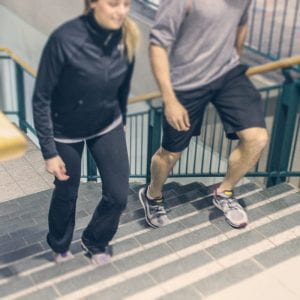We don’t often imagine walking up the stairs instead of taking the elevator as exercise – but we should!

For some of us, when we hear the word exercise we automatically think crowded fitness centres, at-home aerobics DVDs, or competitive sports. Walking has a range of health benefits and it’s a low-impact form of aerobic exercise, which means almost everyone can take part! Walking is a gentle form of exercise as it isn’t as stressful on your joints as jogging or running.
Guidelines as per the Canadian Society for Exercise Physiology states to achieve health benefits, adults aged 18-64 years should accumulate at least 150 minutes of moderate-to vigorous intensity aerobic physical activity per week, in bouts of 10 minutes or more.
To incorporate walking into your daily fitness routine, keep it simple – take a five-minute walk down the street, turn around and walk five minutes back, do that twice a day and you will start to decrease risk factors and increase cardiovascular health. After a week or two of sticking to this regime, increase your duration. This is a realistic and achievable way to get started.
Another variation of this is interval training. Begin by setting yourself a work to rest ratio. Try one minute of speed walking followed by two minutes of normal walking, repeat for 30 minutes.
We know it can be a challenge to adhere to your new fitness goal once you’ve started. Remember to set realistic goals and to break up your walking activities – 150 minutes per week = 30 minutes, five times per week. You can break that down even further by incorporating two 15 minutes walks into your day!
It can be really satisfying to see the distance you’ve walked or the steps you’ve taken in a day. There are lots of great apps you can use to track your activity or by using a pedometer; aim to walk 10,000 steps a day or check out an activity tracking website like UWALK.ca. You are more likely to adhere to your goal or workout plan if you track your progress. If you are successful in achieving your goals, make sure you reward yourself, and then set new ones! Commit yourself to a walking group, like the Walk N’ Tone class we offer here at MacEwan University Sport and Wellness or find a friend who will keep you accountable.
By following these guidelines you can reduce the risk of premature death, coronary heart disease, stroke, hypertension, colon cancer, breast cancer type 2 diabetes and osteoporosis, while improving fitness, body composition and indicators of mental health. So get walking!


